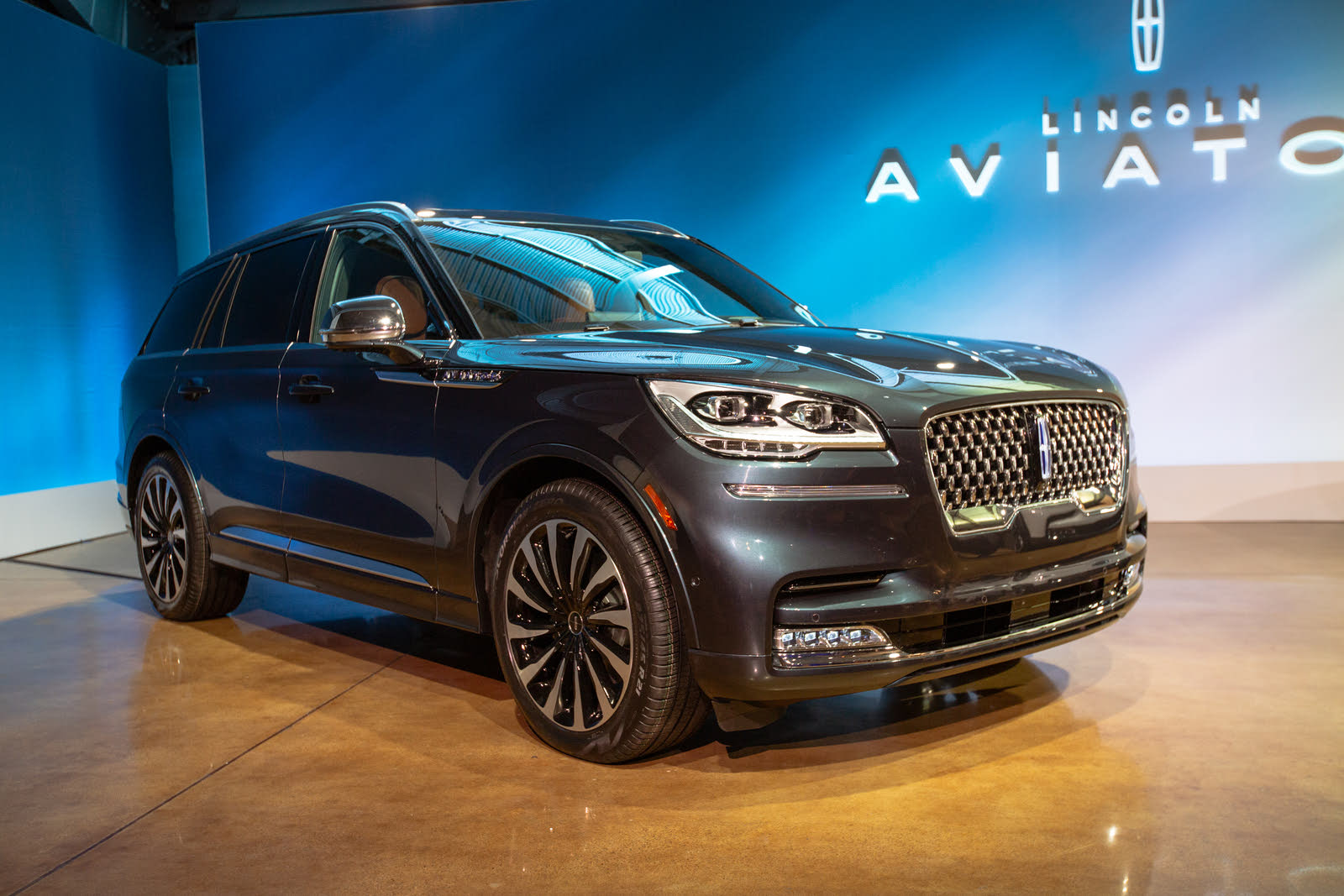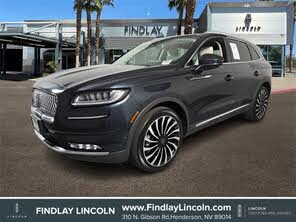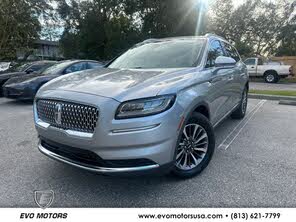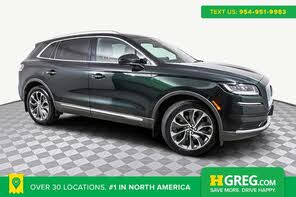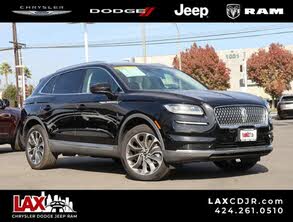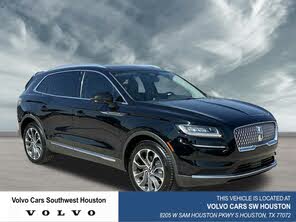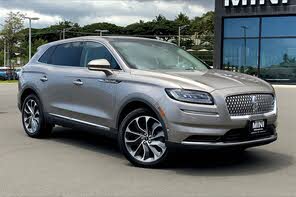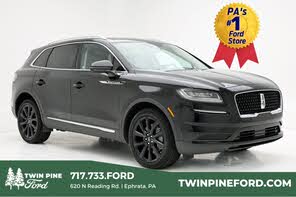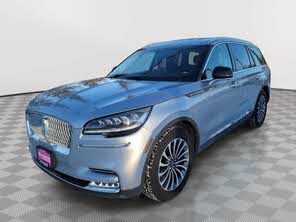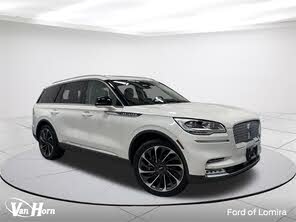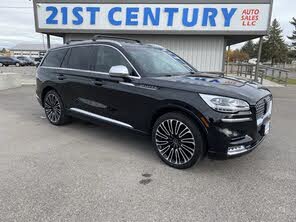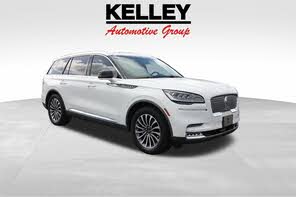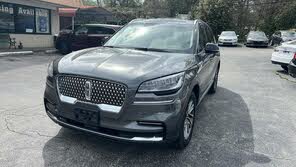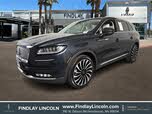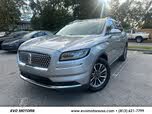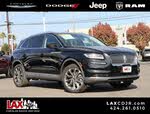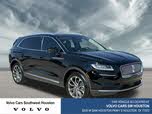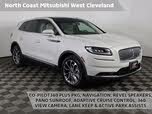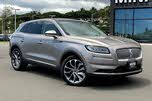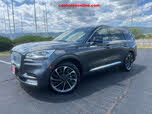2021 Lincoln Nautilus vs 2020 Lincoln Aviator
Overview | |
MSRP$51,100 | MSRP$42,500 |
Average price$35,854 | Average price$32,960 |
Listings546 | Listings919 |
Ratings & Reviews | |
User Reviews | User Reviews |
Expert reviews8.2 out of 10 | Expert reviews8.2 out of 10 |
Pros
| Pros
|
2020 Lincoln Aviator Reviews SummaryThe heyday for Lincoln was more than a half-century ago. Those postwar years of prosperity and optimism were the perfect time for cars like the Continental and others. They delivered comfort and luxury, wrapped in midcentury modern styling. Even as recently as the 1990s, Lincoln was still a popular brand, riding the SUV craze with its Navigator. But after the turn of the century, Lincoln lost its ability to create new designs and looked inward and backward. Sure, retro-themed cars like the redesigned Mustang, PT Cruiser, and Chevy HHR had turned some heads, but none of those came from luxury brands. The BMWs and Mercedes of the world were all looking forward and pushing the envelope for contemporary automotive design. Meanwhile, Lincoln offered the MKX, which was based on the Ford Edge and featured ’66 Continental styling. Neat in a vacuum, but off-base compared to the modern luxury market. This experimental phase with various retro looks coincided with the move to the MK-# alphabet-soup naming convention and big improvements in the Ford lineup, where top-end trims of the Fusion overlapped with an entry-level trim of the MKZ. The combination left Lincoln a confusing, anonymous afterthought in the modern luxury game. But Lincoln is finally ready to change all that. It has a new cohesive design language, its focus is once again on luxury, and the three-letter naming convention that never meant anything to anyone other than Lincoln marketers is gone. The brand led with the 2017 Continental and 2018 Navigator, which are each impressive in their own right. But the company's lineup is growing and now includes the all-new 2020 Lincoln Aviator. Named after a luxury variant of the 2002-2005 Ford Explorer, this new Aviator is also based on the contemporary Explorer platform, but it's a luxury vehicle in its own right. Much of the success of the Lincoln brand may hinge on this midsize, 3-row luxury SUV, so you need to consider its competition, such as the Audi Q7, Infiniti QX60, and all-new Cadillac XT6. Read on to learn if Lincoln’s take on luxury will stand out in a crowded competitive field. | |
2021 Lincoln Nautilus Reviews SummaryThe car market has evolved tremendously over the past decade. Electric cars are cool, the Corvette is mid-engine, the Mustang is an electric SUV, and Ford no longer builds sedans and hatchbacks. There are a lot of firsts and a lot of rethinks about how we drive and buy cars. But it seems no matter how much has evolved, the traditional ideals of luxury in motoring are still very much a thing. Sure, some brands may incorporate performance as their luxury identity, but if you are Lincoln, it means elegant styling, plush interiors, and a hushed boulevard-cruising ride. With the 2021 Lincoln Nautilus, Ford's premium brand has found a way to channel that traditional definition of luxury without feeling dated. The Nautilus is at once classically comfortable and thoroughly modern. With plenty of standard tech that is easy to use, the Nautilus is also an approachable, upscale SUV. Lincoln’s approach is different from that of BMW, Audi, or Lexus. So does taking a different path work better than trying to keep up with the overseas rivals? Read on to find out. | |
No video found | |
Popular Features & Specs | |
Engine3.0L 400 hp V6 | Engine2.0L 250 hp I4 |
Drive TrainRWD | Drive TrainFWD |
Seating Capacity7 | Seating Capacity5 |
Horsepower | Horsepower250 hp @ 5500 rpm |
MPG City18 | MPG City21 |
MPG Highway26 | MPG Highway26 |
Engine | |
Engine Name3.0L 400 hp V6 | Engine Name2.0L 250 hp I4 |
Torque | Torque280 lb-ft @ 3000 rpm |
Horsepower | Horsepower250 hp @ 5500 rpm |
DrivetrainRWD | DrivetrainFWD |
Fuel Economy | |
MPG City18 | MPG City21 |
MPG Highway26 | MPG Highway26 |
Interior | |
Seating Capacity7 | Seating Capacity5 |
Safety | |
Front Crash Overall5 | Front Crash Overall5 |
Side Crash Overall5 | Side Crash Overall5 |
Dimensions & Capacity | |
Cargo Space18.3 cu ft | Cargo Space37.2 cu ft |
Curb Weight4764 lbs | Curb Weight4140 lbs |
Height69.8 in | Height66.2 in |
Length199.3 in | Length190.0 in |
Width89.9 in | Width86.1 in |
Wheelbase119.1 in | Wheelbase112.2 in |
Number of doors4 | Number of doors4 |
Overview | ||
MSRP | $51,100 | $42,500 |
Average price | $35,854 | $32,960 |
Listings | ||
Ratings & Reviews | ||
User reviews | ||
Expert reviews | 8.2 out of 10Read full review | 8.2 out of 10Read full review |
Pros & cons | Pros
| Pros
|
Summary | The heyday for Lincoln was more than a half-century ago. Those postwar years of prosperity and optimism were the perfect time for cars like the Continental and others. They delivered comfort and luxury, wrapped in midcentury modern styling. Even as recently as the 1990s, Lincoln was still a popular brand, riding the SUV craze with its Navigator. But after the turn of the century, Lincoln lost its ability to create new designs and looked inward and backward. Sure, retro-themed cars like the redesigned Mustang, PT Cruiser, and Chevy HHR had turned some heads, but none of those came from luxury brands. The BMWs and Mercedes of the world were all looking forward and pushing the envelope for contemporary automotive design. Meanwhile, Lincoln offered the MKX, which was based on the Ford Edge and featured ’66 Continental styling. Neat in a vacuum, but off-base compared to the modern luxury market. This experimental phase with various retro looks coincided with the move to the MK-# alphabet-soup naming convention and big improvements in the Ford lineup, where top-end trims of the Fusion overlapped with an entry-level trim of the MKZ. The combination left Lincoln a confusing, anonymous afterthought in the modern luxury game. But Lincoln is finally ready to change all that. It has a new cohesive design language, its focus is once again on luxury, and the three-letter naming convention that never meant anything to anyone other than Lincoln marketers is gone. The brand led with the 2017 Continental and 2018 Navigator, which are each impressive in their own right. But the company's lineup is growing and now includes the all-new 2020 Lincoln Aviator. Named after a luxury variant of the 2002-2005 Ford Explorer, this new Aviator is also based on the contemporary Explorer platform, but it's a luxury vehicle in its own right. Much of the success of the Lincoln brand may hinge on this midsize, 3-row luxury SUV, so you need to consider its competition, such as the Audi Q7, Infiniti QX60, and all-new Cadillac XT6. Read on to learn if Lincoln’s take on luxury will stand out in a crowded competitive field. | The car market has evolved tremendously over the past decade. Electric cars are cool, the Corvette is mid-engine, the Mustang is an electric SUV, and Ford no longer builds sedans and hatchbacks. There are a lot of firsts and a lot of rethinks about how we drive and buy cars. But it seems no matter how much has evolved, the traditional ideals of luxury in motoring are still very much a thing. Sure, some brands may incorporate performance as their luxury identity, but if you are Lincoln, it means elegant styling, plush interiors, and a hushed boulevard-cruising ride. With the 2021 Lincoln Nautilus, Ford's premium brand has found a way to channel that traditional definition of luxury without feeling dated. The Nautilus is at once classically comfortable and thoroughly modern. With plenty of standard tech that is easy to use, the Nautilus is also an approachable, upscale SUV. Lincoln’s approach is different from that of BMW, Audi, or Lexus. So does taking a different path work better than trying to keep up with the overseas rivals? Read on to find out. |
Video | No video found | |
Popular Features & Specs | ||
Engine | 3.0L 400 hp V6 | 2.0L 250 hp I4 |
Drive Train | RWD | FWD |
Seating Capacity | 7 | 5 |
Horsepower | 250 hp @ 5500 rpm | |
MPG City | 18 | 21 |
MPG Highway | 26 | 26 |
Engine | ||
Engine Name | 3.0L 400 hp V6 | 2.0L 250 hp I4 |
Torque | 280 lb-ft @ 3000 rpm | |
Horsepower | 250 hp @ 5500 rpm | |
Drivetrain | RWD | FWD |
Fuel Economy | ||
MPG City | 18 | 21 |
MPG Highway | 26 | 26 |
Interior | ||
Seating Capacity | 7 | 5 |
Safety | ||
Front Crash Overall | 5 | 5 |
Side Crash Overall | 5 | 5 |
Dimensions & Capacity | ||
Cargo Space | 18.3 cu ft | 37.2 cu ft |
Curb Weight | 4764 lbs | 4140 lbs |
Height | 69.8 in | 66.2 in |
Length | 199.3 in | 190.0 in |
Width | 89.9 in | 86.1 in |
Wheelbase | 119.1 in | 112.2 in |
Number of doors | 4 | 4 |
The 2020 Lincoln Aviator slotted below the Navigator and above the compact MKC and its replacement, the Lincoln Corsair. The Aviator's design featured a unified look across Lincoln's lineup, with handsome headlights and an upright chrome grille. Its roofline tapered, giving it an elongated appearance, and the low, wide beltline added a boat-like look. Inside, the Aviator's cabin had a flowing design with soft-touch materials and selective use of brightwork. The seats were both elegant and sturdy, and the shifter buttons had a piano-key design. The front seats were incredibly comfortable, using soft-touch materials throughout, including plush leather on the dash, door panels, and center console. The Aviator also had unique touches like a massive panoramic moonroof and warning jingles recorded by the Detroit Symphony Orchestra.
The 2021 Lincoln Nautilus, previously known as the MKX, was based on the same platform as the Ford Edge. The Nautilus featured a sharp new dash design with clean lines, soft materials, and a large, crisp touchscreen. It also had Lincoln’s “Piano Key” shifter-button layout, which was easy to use. The standard 13.2-inch SYNC 4 touchscreen system was gorgeous and user-friendly, similar to Ford’s SYNC 3. The Nautilus had a sensible menu layout and wireless Apple CarPlay and Android Auto. The interior featured soft-touch materials and comfortable seats, with the front seats being the optimal places to sit, especially with the available 22-way multi-contour power-adjustable units. The Nautilus also had a reasonably large center console bin and deep in-door pockets for storage.
The 2020 Lincoln Aviator came standard with a twin-turbocharged 3.0-liter V6 engine, producing 400 horsepower and 415 pound-feet of torque. The Grand Touring trim combined this engine with a 100-hp electric motor, resulting in a net 494 hp and 630 lb-ft of torque. Both powertrains used a 10-speed automatic transmission, with the base V6 offering rear-wheel drive (RWD) or all-wheel drive (AWD), while the plug-in hybrid (PHEV) was AWD. Both versions could accelerate from 0-60 mph in about 4 seconds. The Grand Touring’s hybrid setup provided smooth and confident acceleration, with the PHEV using electric power at low speeds. The Aviator's steering was light, and its brakes were cushioned in their feedback. The fuel economy for the conventionally powered Aviator with RWD was 18 mpg city, 26 highway, 21 combined, while the AWD version had slightly lower numbers. The PHEV drivetrain had a combined 23 mpg, with a 21-mile electric-only range and a rating of 56 miles-per-gallon equivalent combined.
The 2021 Lincoln Nautilus came standard with a turbocharged 2.0-liter four-cylinder engine, producing 250 horsepower and 280 pound-feet of torque. The Reserve and Black Label trims offered a twin-turbocharged 2.7-liter V6, making 355 hp and 380 lb-ft of torque. Both engines used an eight-speed automatic transmission, with the four-cylinder offering front-wheel drive (FWD) or AWD, while the twin-turbo V6 came standard with AWD. The twin-turbo V6 provided smooth and controlled acceleration, complementing the adaptive suspension that nearly eliminated bumps in the road. The Nautilus had an engine stop-start feature to conserve fuel, but the engine restart had a slight delay. Overall, driving the Nautilus was pleasant in nearly all scenarios.
The 2020 Lincoln Aviator, with its three rows, competed with the Audi Q7, Infiniti QX60, Mercedes-Benz GLE, Land Rover Discovery, and Cadillac XT6. The optional second-row captain’s chairs were fantastic, while the power-closing third row was adequate for adults but best suited for kids on longer trips. Dropping the second and third rows provided 77 cubic feet of cargo space, on par with the Cadillac XT6. The Aviator had some confusing controls, like the door handles and seat controls, which required some getting used to. The door-release function was particularly complicated, with a button instead of a conventional handle, raising concerns about usability in emergencies.
The 2021 Lincoln Nautilus provided up to 68.8 cubic feet of cargo space, more than the Lexus RX 350 and Cadillac XT5. With the rear seats in use, it had 37.2 cubic feet of cargo space. A power liftgate was standard, with a hands-free option available. The Nautilus emphasized two-row comfort, with plenty of head- and legroom in the rear seats, making them comfortable for adults on long trips. The front seats were the optimal places to sit, especially with the available 22-way multi-contour power-adjustable units. The Nautilus also had a large center console bin and deep in-door pockets for storage, with a floating center controls design allowing for additional storage.
The 2020 Lincoln Aviator came standard with the Sync 3 infotainment system, operated via a 10.1-inch touchscreen. The screen used a conventional landscape layout, presenting Apple CarPlay and Android Auto across the entire screen. The Aviator also had a fully digital instrument panel and a massive head-up display, providing a lot of information in a minimalist and unobtrusive manner.
The 2021 Lincoln Nautilus featured a 13.2-inch touchscreen infotainment system with high-definition graphics and a sensible menu layout. The wireless Apple CarPlay and Android Auto presented well on the large screen, with no barriers to entry or secret handshakes. The available wireless charging pad made the relationship between phone and car easier. The Nautilus also came with the Revel 19-speaker premium audio system, providing incredible sound for both music and talk radio listening.
The 2020 Lincoln Aviator came with standard safety features, including front and side-impact airbags, traction control, and a tire pressure monitoring system. The Aviator also had a full complement of driver-assistance systems as part of Lincoln Co-Pilot360, including forward-collision avoidance, lane-departure warning, adaptive cruise control, automatic high beams, blind-spot monitoring, and a head-up display.
The 2021 Lincoln Nautilus came with a comprehensive list of driver-assistance features as part of the standard CoPilot360 package, including automatic emergency braking with pedestrian detection, forward-collision warning, lane-departure warning, automatic high beams, blind-spot monitoring, and rear cross-traffic alert. Additional available features included adaptive cruise control, front parking sensors, surround-view parking monitor, and adaptive headlights. However, the standard backup camera was low-quality, making it hard to see in low-light scenarios.
CarGurus highlights

According to CarGurus experts, the overall rating for the 2020 Lincoln Aviator is 8.2 out of 10, while the 2021 Lincoln Nautilus scores 8.2 out of 10. Both vehicles offer a blend of luxury, performance, and technology, but the Aviator's three-row seating and powerful hybrid options make it a more versatile choice for families. Therefore, the 2020 Lincoln Aviator is the recommended option based on these ratings.
Choose the 2021 Lincoln Nautilus if:
- You want a midsize luxury SUV with a focus on two-row comfort.
- You prefer a user-friendly infotainment system with a large touchscreen.
- You value a comprehensive list of driver-assistance features.
Choose the 2020 Lincoln Aviator if:
- You need a three-row SUV with ample cargo space.
- You prefer a powerful engine with hybrid options.
- You appreciate unique luxury touches like orchestral warning jingles.
CarGurus highlights

According to CarGurus experts, the overall rating for the 2020 Lincoln Aviator is 8.2 out of 10, while the 2021 Lincoln Nautilus scores 8.2 out of 10. Both vehicles offer a blend of luxury, performance, and technology, but the Aviator's three-row seating and powerful hybrid options make it a more versatile choice for families. Therefore, the 2020 Lincoln Aviator is the recommended option based on these ratings.
Choose the 2021 Lincoln Nautilus if:
Shop Now- You want a midsize luxury SUV with a focus on two-row comfort.
- You prefer a user-friendly infotainment system with a large touchscreen.
- You value a comprehensive list of driver-assistance features.
Choose the 2020 Lincoln Aviator if:
Shop Now- You need a three-row SUV with ample cargo space.
- You prefer a powerful engine with hybrid options.
- You appreciate unique luxury touches like orchestral warning jingles.

By: CarGurus + AI
At CarGurus, our team of experienced automotive writers remain at the heart of our content operation, conducting hands-on car tests and writing insightful guides that are backed by years of industry experience. To complement this, we are harnessing AI to make our content offering more diverse and more helpful to shoppers than ever. To achieve this, our AI systems are based exclusively on CarGurus content, ratings and data, so that what we produce is both unique to CarGurus, and uniquely helpful to car shoppers.
